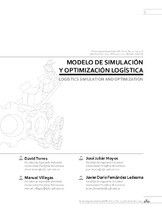| dc.contributor.author | Torres, David | |
| dc.contributor.author | Hoyos, José Julián | |
| dc.contributor.author | Villegas, Manuel | |
| dc.contributor.author | Fernández Ledesma, Javier Darío | |
| dc.coverage.spatial | Seccional Medellín | spa |
| dc.date.accessioned | 2020-11-24T18:52:53Z | |
| dc.date.available | 2020-11-24T18:52:53Z | |
| dc.date.issued | 2013 | |
| dc.identifier.uri | http://hdl.handle.net/20.500.11912/6480 | |
| dc.description | p. 9 - 26 | spa |
| dc.description.abstract | El transporte en la cadena de suministro de las organizaciones se ha constituido como un proceso clave para garantizar que los demás procesos, como producción y ventas se realicen de manera eficiente y oportuna, esto con el fin de prestar un excelente servicio al cliente. Para el caso concreto de Colombia es claro que se tienen deficiencias en la infraestructura vial del país, y esto para las organizaciones representa un problema, que de no existir políticas claras del gobierno central debe ser abordado desde las opciones que la ingeniería ofrece, para hacer que los procesos de transporte sean más óptimos y eficientes, y de esta manera no comprometer los demás procesos que componen la cadena de suministro. En el presente estudio se analiza un modelo del proceso de carga-transporte-descarga desde los puertos de Barranquilla y Buenaventura hasta la ciudad de Bogotá, mediante la simulación discreta, buscando presentar alternativas que optimicen el proceso. | spa |
| dc.description.abstract | Transportation in the supply chain of organizations has been established as a key process to guarantee that all other processes, such as production and sales, are made efficiently and timely, this in order to provide excellent customer service. For the specific case of Colombia it is clear that they have
deficiencies in the country’s road infrastructure, and this issue for organizations is a problem, that in
the absence of clear policies of the central government should be approached from the options that
engineering offers to make transport processes more optimal and efficient, and thus avoid compromising the other processes that make up the supply chain. In the present study is analyzed a charge-transport-download model process from the ports of Barranquilla and Buenaventura to Bogotá,
by discrete simulation, seeking to present alternatives that optimize the process. | spa |
| dc.format.mimetype | application/pdf | |
| dc.language.iso | spa | |
| dc.publisher | Universidad Pontificia Bolivariana | spa |
| dc.relation.ispartof | Revista Ingeniería Industrial | spa |
| dc.rights | Attribution-NonCommercial-NoDerivatives 4.0 International | * |
| dc.rights.uri | http://creativecommons.org/licenses/by-nc-nd/4.0/ | * |
| dc.subject | Cadena de suministro | spa |
| dc.subject | Transporte | spa |
| dc.subject | Simulación | spa |
| dc.subject | Supply Chain | spa |
| dc.subject | Transportation | spa |
| dc.subject | Simulation | spa |
| dc.title | Modelo de simulación y optimización logística | spa |
| dc.title.alternative | Logistics simulation and optimization | spa |
| dc.type | article | spa |
| dc.rights.accessRights | openAccess | spa |
| dc.type.hasVersion | publishedVersion | spa |
| dc.description.sectional | Medellín | spa |
| dc.identifier.instname | instname:Universidad Pontificia Bolivariana | spa |
| dc.identifier.reponame | reponame:Repositorio Institucional de la Universidad Pontificia Bolivariana | spa |
| dc.identifier.repourl | repourl:https://repository.unab.edu.co/ | |


